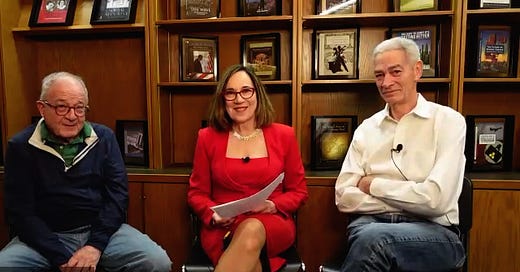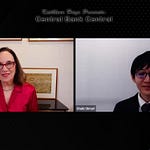The Shadow Open Market Committee has been monitoring, assessing, and critiquing the policies of the Federal Open Market Committee, the Federal Reserves main policy making body, for five decades. Two of the SOMC’s finest, Michael Bordo and Mickey Levy, are celebrating the 50-year anniversary with a broad and in-depth look at how the SOMC started, how it evolved over the years, where it is now, and the challenges that lie ahead,
In the midst of the SOMC’s celebratory conference held at the Hoover Institution at Stanford University , they joined me to share an in depth look at the history of how and why the organization got started, how it has helped drive the evolution of the Federal Reserve’s monetary policy over the years, and how the Fed could have avoided its three biggest mistakes in this time period had they followed the rules the SOMC has developed and promoted over the past five decades.
So sit back and get ready to hear these two economists tell this fascinating story in a way that will inform you and even give you a laugh or two long the way.
And if you want to read it as well here is the link:
The 50-Year History of the Shadow Open Market Committee and the Evolution of Monetary Policy
by Michael D. Bordo and Mickey D. Levy
A 50-Year Retrospective on the Shadow Open Market Committee and Its Role in Monetary Policy The Hoover Institution October 13-14, 2024
https://www.hoover.org/sites/default/files/2024-10/Bordo_Levy_The%2050-year%20history%20of%20the%20SOMC%20and%20evolution%20of%20monetary%20policy.pdf
Michael D. Bordo is the Ilene and Morton Harris Distinguished Visiting Fellow at the Hoover Institution. Bordo is a Board of Governors Professor of Economics and director of the Center for Monetary and Financial History at Rutgers University, New Brunswick, New Jersey. He has held academic positions at the University of South Carolina and Carleton University in Ottawa, Canada. Bordo has been a visiting professor at the University of California at Los Angeles, Carnegie Mellon University, Princeton University, Harvard University, and Cambridge University, where he was the Pitt Professor of American History and Institutions. He is currently a distinguished visiting fellow at the Hoover Institution, Stanford University. He has been a visiting scholar at the International Monetary Fund; the Federal Reserve Banks of St. Louis, Cleveland, and Dallas; the Federal Reserve Board of Governors; the Bank of Canada; the Bank of England; and the Bank for International Settlement. He is a research associate of the National Bureau of Economic Research, Cambridge, Massachusetts, and a member of the Shadow Open Market Committee. He is also a member of the Federal Reserve Centennial Advisory Committee. He has a BA degree from McGill University, an MSc in economics from the London School of Economics, and PhD from the University of Chicago in 1972.
Mickey Levy is a macroeconomist who uniquely analyzes economic and financial market performance and how they are affected by monetary and fiscal policies. Dr. Levy started his career conducting research at the Congressional Budget Office and American Enterprise Institute, and for many years was Chief Economist at Bank of America, followed by Berenberg Capital Markets. He is a long-standing member of the Shadow Open Market Committee and is also a Visiting Scholar at the Hoover Institution at Stanford University.
Dr. Levy is a leading expert on the Federal Reserve’s monetary policy, with a deep understanding of fiscal policy and how they interact. He has researched and spoken extensively on financial market behavior, and has a strong track record in forecasting. Dr. Levy’s early research was on the Fed’s debt monetization and different aspects of the government’s public finances. He has written hundreds of articles and papers for leading economic journals on U.S. and global economic conditions, and has been an active voice on how financial markets are influenced by monetary policy. He has testified frequently before the U.S. Congress on monetary and fiscal policies, banking and credit conditions, regulations, and global trade, and is a frequent contributor to the Wall Street Journal, Bloomberg, and other media.













Share this post